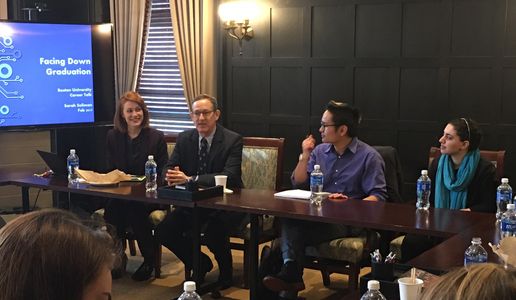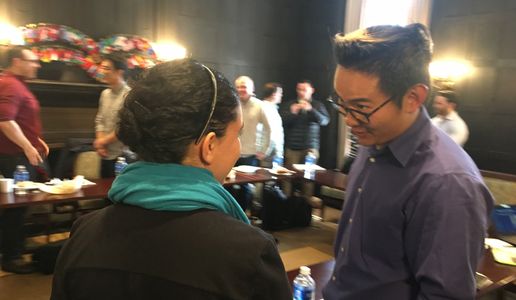RAND Analyst Meets with Pardee Students

Sarah Soliman, a technical analyst at the RAND Corporation, visited the Frederick S. Pardee School of Global Studies on February 8, 2017 to deliver a career seminar for students looking for entry level positions, present her research findings and participate in a working dinner with Pardee School students. John D. Woodward Jr., Professor of the Practice of International Relations at the Pardee School, served as the moderator for these events.
In her career talk, Soliman discussed entry level opportunities with the government, national security-related private contractors and public-policy organizations. She stressed the importance of networking, and encouraged students to attend guest lectures and meet visitors to Boston University as well as emphasizing the need for young professionals to engage with mentors in their fields of interest to help them find opportunities such as internships. Soliman had the students participate in a biometrics-based iris recognition exercise to encourage them to overcome their shyness and possible fears of bothering mentors.

Soliman also gave a lecture on “Tracing Identity: From War Zones to Social Media” during which she discussed her work at RAND as well as a brief history of the use of biometrics by the United States military. As part of Operations Iraqi Freedom and Enduring Freedom, Soliman traveled throughout Iraq and Afghanistan for two years as a field engineer supporting Intelligence, Surveillance, and Reconnaissance (ISR) and biometrics applications, including work with U.S. Special Operations Command. She highlighted lessons learned from these experiences.
She said a 2004 suicide bombing at U.S. Forward Operating Base Moraz in Mosul, Iraq, was a major turning point for the use of biometrics by the military and went on to describe some of the ways the use of biometrics has increased in the field.
Soliman also discussed how social media could be used to help identify people, which she called “Digital Fingerprinting.” By studying Facebook or by tracking who uses a particular hashtag, analysts are able to develop an identity of individuals who may threaten U.S. national security, such as members of ISIS. However, Soilman stressed the importance of maintaining a balance between security and privacy and the necessity to protect biometric data collected, especially after the 2015 Office of Personnel Management hack.
Soliman then joined 20 students for a working dinner where she discussed additional research projects she has worked on such as studying traumatic brain injuries in the military and using social media to detect suicide vulnerability.